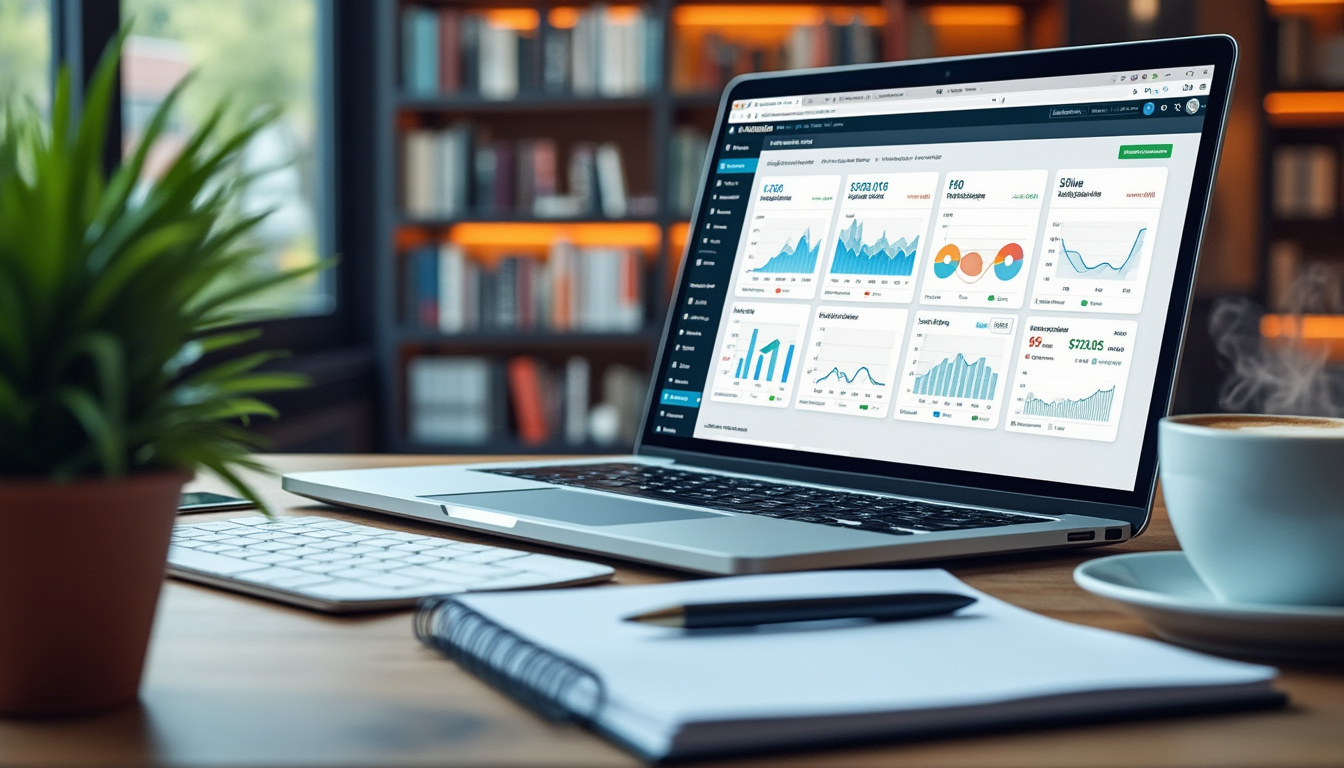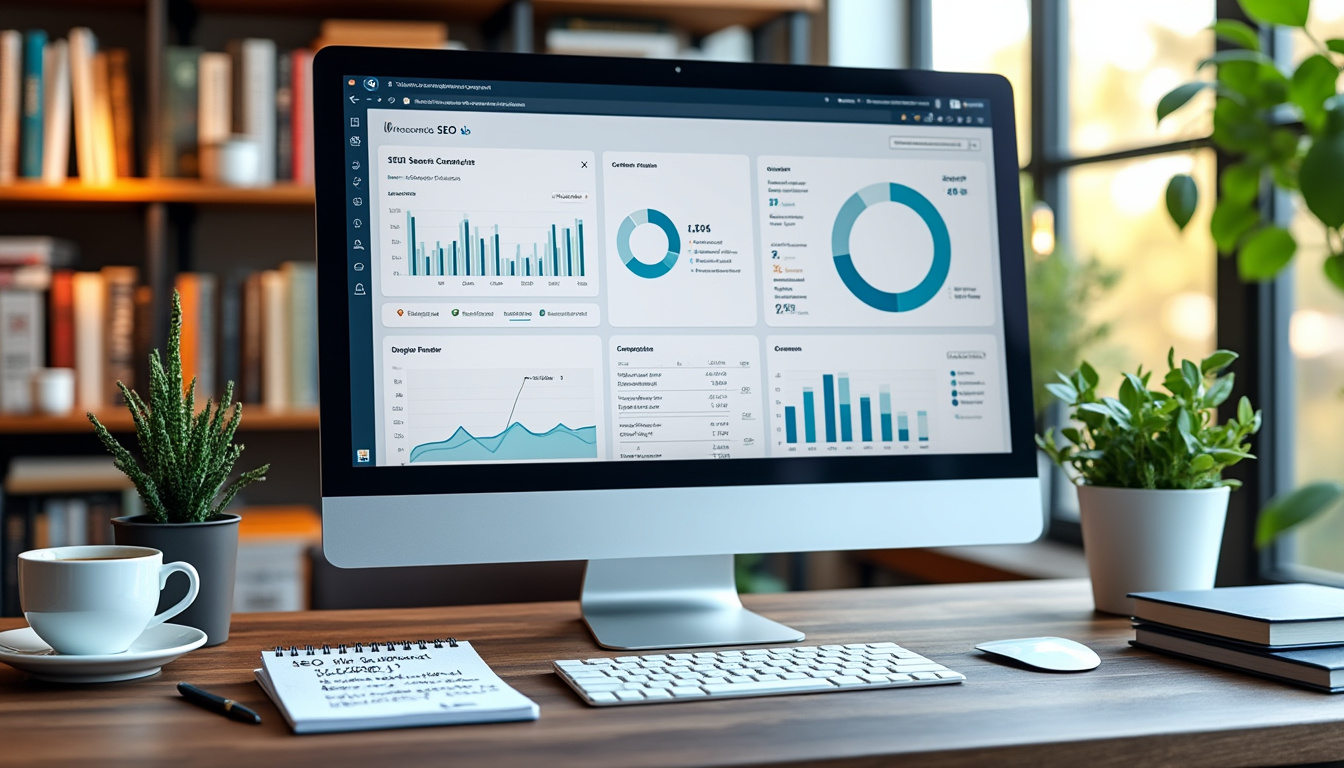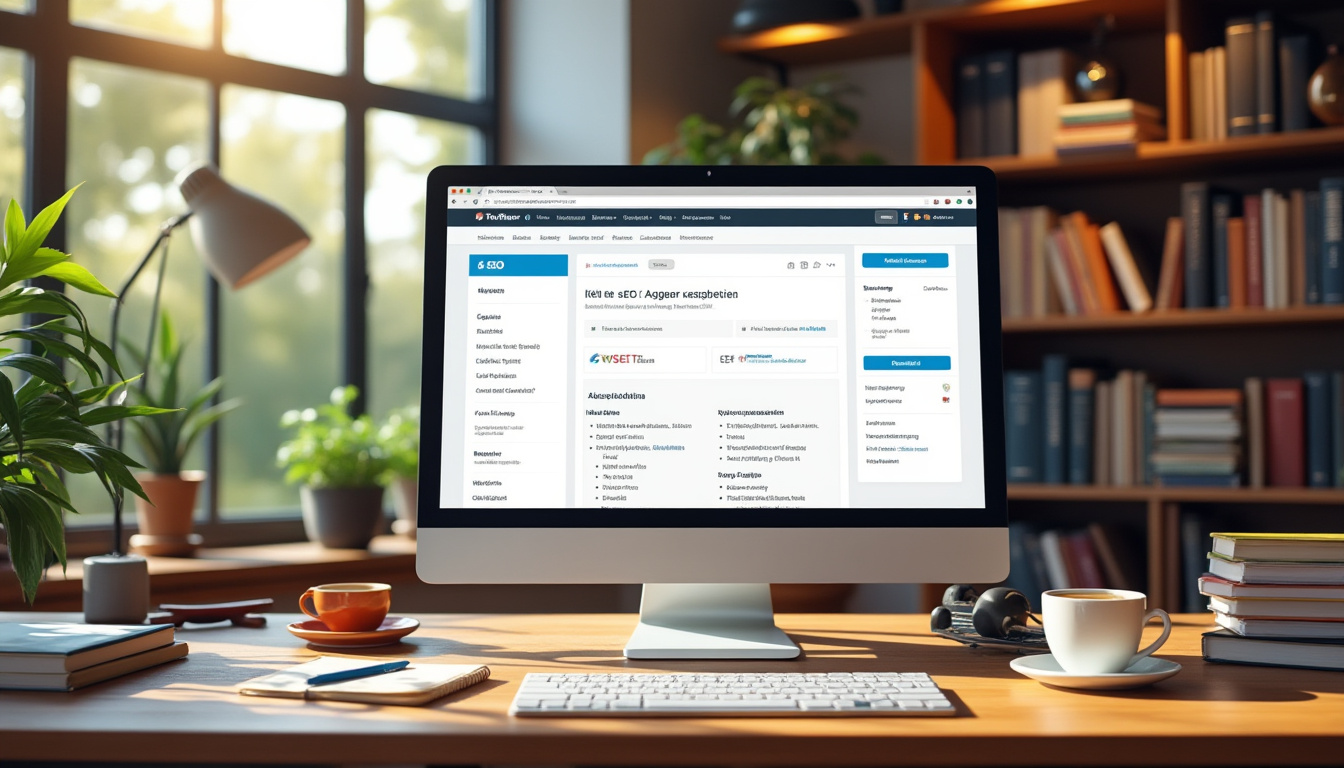Optimizing your WordPress site for local SEO is essential for enhancing visibility among nearby customers. Start by completing your Google My Business (GMB) profile, which will help you connect with a broader audience. Utilize a reliable SEO plugin with local features to manage key elements effortlessly.
Conduct thorough local keyword research to create content that resonates with your audience, such as themed articles highlighting local attractions or services. Additionally, make sure to add Google Maps to your site to improve functionality and user experience.
Regularly verify and update your business information across platforms like Yelp and Yellow Pages while focusing on collecting online reviews and managing your NAP citations. Prioritize creating a consistent content strategy and utilize local links to strengthen your site’s authority in your area.
Lastly, ensure your site is mobile responsive and fast-loading to meet user expectations and improve your search rankings effectively.
In today’s competitive digital landscape, implementing local SEO strategies in WordPress is essential for small businesses aiming to increase visibility in their local markets. This article delves into various techniques that can help improve your site’s local search performance. We’ll cover everything from optimizing your Google My Business profile to conducting local keyword research and enhancing your website’s speed. Each strategy will be explained in detail to ensure you have a comprehensive understanding of how to position your WordPress site for local success.
Setting Up Google My Business
The cornerstone of any local SEO strategy is a well-optimized Google My Business (GMB) profile. Completing your GMB profile means filling out crucial information such as your business name, address, phone number, and business hours. This profile serves as a verification point for search engines and potential customers, increasing your chances of appearing in local search results.
To set up your GMB profile, start by visiting the Google My Business website. Follow the on-screen instructions, and ensure that all business information is accurate and up-to-date. Don’t forget to choose the correct categories that define what your business does to help Google classify and display your business accurately.
Utilizing SEO Plugins for Local Optimization
WordPress offers a variety of SEO plugins that can enhance your local SEO efforts. Choose a plugin that specializes in local SEO features. Popular options include Yoast SEO and Rank Math, both of which have dedicated modules for local businesses.
These plugins allow you to optimize your site effectively, including adding structured data markup. This markup helps search engines understand your business better and can improve your visibility in local search results. Follow the documentation provided by these plugins to ensure proper configuration.
Implementing Local Schema Markup
Incorporating local schema markup is crucial for enhancing your site’s chances of appearing in local search results. Schema markup is code that you can add to your website to provide search engines with information about your business. This structure helps search engines display rich snippets in search results, drawing more attention to your business listing.
Look for plugins that can help generate this markup automatically, or you can manually add it using JSON-LD scripts. Include essential details such as your business name, address, phone number, and operational hours. This can substantially enhance your local visibility.
Conducting Local Keyword Research
Understanding the terms potential customers are searching for is vital for local SEO success. Local keyword research involves identifying relevant keywords and phrases that describe your products or services and incorporate local identifiers (e.g., the name of your city). Utilizing tools such as Google Keyword Planner, SEMrush, or Ahrefs can help streamline this process.
Focus on long-tail keywords that reflect common local queries, such as “best coffee shop in [your city]” or “plumber near me.” By optimizing your content with these localized keywords, you can increase the likelihood of attracting local traffic to your website.
Creating Localized Content
Content creation is a powerful way to enhance your website’s local SEO efforts. Aim to produce content that is relevant to your local community or industry. For instance, consider writing blog posts such as “Top 10 Things to Do in [Your City]” or “A Guide to Local Events and Festivals in [Your City].”
Engaging content not only provides value to your audience but also improves your ranking potential. Make sure to include your targeted local keywords naturally within the content to boost its relevance further.
Enhancing Website Speed
Website speed plays a significant role in SEO ranking factors, including local SEO. A fast-loading site improves user experience, reduces bounce rates, and can impact your search engine rankings. To enhance your website speed, consider the following:
- Optimize images by compressing them without losing quality.
- Utilize caching plugins to speed up loading times.
- Minimize the use of external scripts and excessive plugins.
For more specific guidelines on improving your site speed, you can refer to resources like this detailed guide.
Improving Online Reviews and Reputation Management
Online reviews significantly impact local SEO rankings. Encourage satisfied customers to leave positive reviews on platforms like Google, Yelp, and TripAdvisor. Responding to reviews—both positive and negative—demonstrates to search engines and potential customers that you value customer feedback and engagement.
When crafting your responses, use appropriate local keywords to enhance your online visibility. For example, if you received a review that mentions your location or services, it helps Google associate those keywords with your business.
Encouraging User-Generated Content
Utilize user-generated content as a way to boost your local SEO. Encourage customers to share their experiences with your business on social media or your website. You can create campaigns that include contests or giveaways that motivate users to share photos or testimonials.
This content adds authenticity to your site while reinforcing community ties, and the local context enhances search visibility. Make sure to display this content prominently on your website to maximize its impact.
Link Building for Local SEO
Building quality backlinks from reputable local websites is essential for establishing authority in local searches. Start by identifying local businesses, organizations, or influencers who share synergy with your brand and explore opportunities for collaboration.
Consider guest blogging on local publications, sponsoring community events, or partnering with local influencers. These strategies not only create strong backlinks but also foster goodwill and brand visibility within your community.
Focus on NAP Consistency
Maintaining consistent NAP (Name, Address, Phone Number) information across all online platforms is vital. Any discrepancies can confuse search engines and potential customers, affecting your local rankings. Ensure that your NAP information is consistent on your website, social media profiles, and local directories.
You can use tools like Moz Local or Yext to help maintain this consistency across various platforms.
Utilizing Google Maps and Location Pages
Integrating Google Maps on your website helps customers locate your business easily. Make sure to embed a Google Map on your contact page and include a call-to-action that invites customers to visit your physical location.
Additionally, you may benefit from creating unique location pages if your business operates in multiple areas. Each page should be optimized for local keywords that cater specifically to that area’s audience, helping to improve your site’s relevance in local searches.
Mobile Responsiveness and Its Impact
With the increasing number of users accessing websites via mobile devices, ensuring that your site is mobile-responsive is critical. Google favors mobile-friendly sites in its ranking algorithms, particularly for local searches. Make sure your WordPress theme is optimized for mobile devices and consider using tools like Google’s Mobile-Friendly Test to check your site’s performance.
Improving mobile responsiveness not only helps your local SEO but also enhances the user experience, resulting in lower bounce rates and higher conversion rates.
Regular Analytics Monitoring
Tracking your local SEO performance through analytics is crucial for understanding what’s working and what needs improvement. By utilizing tools like Google Analytics and Google Search Console, you can monitor key metrics, including site traffic, user behavior, and conversion rates.
Regularly reviewing this data allows you to reassess your local SEO strategy, adjust your content accordingly, and capitalize on what performs best. Incorporate learned insights into your ongoing optimization efforts to continually improve your local search visibility.
By implementing these practical local SEO strategies on your WordPress site, you can significantly increase your business’s visibility within your local community. From optimizing your GMB profile to maintaining consistency in your NAP information and encouraging online reviews, each of these steps will contribute to your overall success in local search results.
Implementing effective local SEO strategies in WordPress can significantly enhance your online presence and attract more customers. From optimizing your Google My Business (GMB) profile to using the right SEO plugins, this guide provides actionable insights tailored for small business owners seeking to boost their visibility in local search results.
Complete Your Google My Business Profile
The foundation of your local SEO strategy begins with Google My Business. By completing your GMB profile, you can connect with potential customers searching for services in your area. Ensure all your business details, such as address, contact information, and business hours, are accurate and regularly updated. Additionally, including high-quality images and encouraging reviews can enhance your profile’s appeal and discoverability.
Utilize a WordPress SEO Plugin with Local Features
Choosing the right SEO plugin for your WordPress site is essential for implementing effective local SEO strategies. Plugins such as Yoast SEO or Rank Math come equipped with local SEO features, allowing you to manage basic optimization tasks efficiently. These tools enable you to modify SEO titles, meta descriptions, and even generate XML sitemaps, contributing to better search visibility.
Incorporate Google Maps
Adding Google Maps to your website not only improves user experience but also assists search engines in understanding your location. Embedding a Google Map on your contact page or homepage helps customers find your location easily, which is crucial for local businesses. This functionality can also improve your local search ranking by providing geographical context.
Conduct Local Keyword Research
Understanding what your target audience is searching for is critical. Conduct thorough local keyword research to identify the phrases potential customers use to find services in your area. Incorporate these keywords naturally into your website content, blog posts, and product descriptions. For example, creating a post titled “Top 10 Restaurants in [Your City]” can capture traffic from local searches while positioning your business as a community leader.
Create Local-Focused Content
Content creation is a vital aspect of local SEO. Your website should feature content that resonates with local audiences, addressing their needs and interests. Sharing articles, blogs, or guides on local events, tips, and attractions can establish your authority and attract local traffic. Moreover, using local keywords in your content will further optimize your site for relevant searches.
Monitor Your NAP Consistency
Ensure consistency in your Name, Address, and Phone number (NAP) across all online platforms, including your website, social media, and online directories. Discrepancies can confuse search engines and lower your local SEO ranking. Regularly verify that your information is accurate and up-to-date on platforms like Yelp and Yellow Pages.
Encourage and Manage Online Reviews
Online reviews play a significant role in building trust and credibility for local businesses. Encourage your satisfied customers to leave positive reviews on platforms like Google and Yelp. Respond to reviews professionally, whether positive or negative, to showcase your commitment to customer service. A higher volume of positive reviews can greatly influence your rankings on local search results.
Leverage Local Link Building
Building links from local websites can enhance your site’s authority and improve your local SEO. Identify local blogs, organizations, or businesses that may be interested in collaborating or guest-posting. Participating in community events, sponsoring local groups, or partnering with other businesses can also yield valuable backlinks to your site.
Maintain Mobile Responsiveness
With a growing number of users accessing websites from mobile devices, ensuring your WordPress site is mobile-responsive is crucial for local SEO. A responsive design ensures seamless navigation across all devices, keeping visitors engaged and reducing bounce rates. Additionally, Google prioritizes mobile-friendly websites in its search rankings, affecting your visibility in local searches.
Optimize On-Page SEO Elements
On-page SEO plays an essential role in your site’s local optimization. Ensure that crucial elements like titles, meta descriptions, header tags, and internal links are optimized for your local keywords. For more tips on how to write compelling SEO titles and descriptions in WordPress, check out this resource: How to Write Compelling SEO Titles and Descriptions in WordPress.
Integrate Google Analytics
Tracking the performance of your local SEO efforts is vital for ongoing strategy improvement. Integrating Google Analytics into your WordPress site helps you collect data on user behavior and traffic sources. This insight allows you to adjust your tactics and focus on the strategies that drive the most local traffic and conversions. If you need assistance with this integration, you can refer to this guide: How to Integrate Google Analytics into WordPress for Effective SEO.
Stay Updated with Local SEO Trends
The realm of local SEO is always evolving. Therefore, stay informed about the latest trends, tools, and strategies to adapt your approach effectively. Regularly exploring resources and expert blogs, such as Local SEO Tips, can help you make informed decisions and keep your strategies relevant.
Comparative Analysis of Local SEO Strategies for WordPress
| Local SEO Strategy | Description |
| Google My Business | Ensure your profile is complete with accurate business information. |
| Local Keywords | Conduct research to identify keywords that resonate with local searches. |
| SEO Plugin | Install a plugin suited for local SEO features to enhance optimization. |
| Online Reviews | Encourage customers to leave positive reviews to improve credibility. |
| Mobile Responsiveness | Optimize your site for mobile users to boost search rankings. |
| Content Strategy | Create local content that engages your audience and drives traffic. |
| NAP Consistency | Maintain consistent Name, Address, and Phone number across platforms. |
| Local Link Building | Develop relationships with local businesses to earn relevant backlinks. |
| Business Hours | Clearly display your operating hours to inform potential customers. |
Implementing Local SEO Strategies in WordPress
Local SEO is crucial for small businesses aiming to improve their online visibility and attract more customers in their area. Effectively implementing local SEO strategies in WordPress can enhance your site’s rankings in local search results, making it easier for potential customers to find your business. This guide outlines key steps, including optimizing your Google My Business profile, conducting local keyword research, and creating relevant content.
Optimize Your Google My Business Profile
Your Google My Business (GMB) profile is one of the most important components of local SEO. To begin, claim your GMB listing and ensure all information is accurate and up-to-date. This includes your business name, address, phone number, and business hours. A complete and optimized GMB profile can significantly boost your visibility in local search results.
Add relevant categories that best describe your business, as these categories help search engines understand your services. Additionally, regularly engage with customers by responding to reviews and posting updates or promotions, which can increase customer engagement and improve local search rankings.
Utilize Local SEO Plugins
To enhance your WordPress site further, consider using local SEO plugins specifically designed to help with local search optimization. Plugins like Yoast SEO or Rank Math offer features that guide you through local SEO best practices. They help audit your content, improve on-page SEO, and provide suggestions for more effective local keyword integration.
Additionally, look for plugins that integrate Google Maps into your website. By embedding Google Maps, you can provide customers with a visual reference of your location, making it easier for them to find you in real life.
Conduct Local Keyword Research
Local keyword research is essential for creating content that resonates with your target audience. Start by identifying keywords that incorporate your location, such as “best pizza in [your city]” or “plumbers near me.” Tools like Google Keyword Planner or Ubersuggest can help you find relevant local keywords to optimize your content.
Once you identify these keywords, incorporate them naturally into your website’s content, headings, and meta descriptions. This will improve your chances of ranking highly for relevant local search queries while ensuring the content remains valuable to your readers.
Create Locally-Focused Content
Creating content that targets local interests can significantly boost your local SEO. Consider writing blog posts about local events, restaurants, or attractions tailored to your audience. Examples might include articles like “Top 10 Places to Visit in [Your City]” or “Local Events Happening This Month.” These types of posts not only engage your audience but also attract backlinks, further improving your site’s authority.
Manage Online Reviews and Reputation
Your online reputation can heavily influence local SEO. Encourage satisfied customers to leave positive reviews on your GMB profile, Yelp, or other platforms. More positive reviews will enhance your credibility and improve your chances of ranking higher in local searches.
Additionally, don’t forget to respond to reviews, both positive and negative. Engaging with customers shows that you value their feedback and are actively involved in your community, which can further bolster your reputation and local rankings.
Optimize Site Structure and Local Citations
Ensure that your website has a clear structure that makes it easy for search engines to crawl and index your pages. Create a dedicated page for your business location that includes your NAP (name, address, phone number) details. Consistency is key; ensure that your NAP information is the same across all online platforms, including directories and social media.
Utilizing local citations—mentions of your business on other websites—can also significantly contribute to your local SEO strategy. Be proactive in getting listed in local business directories, as these citations help improve your online visibility and credibility.
FAQ: Implementing Local SEO Strategies in WordPress
What is local SEO and why is it important? Local SEO focuses on optimizing your online presence to attract more business from relevant local searches. It helps businesses promote their products and services to local customers at the exact time they’re looking for them.
How can I optimize my WordPress site for local SEO? Start by completing your Google My Business (GMB) profile. Ensure your business information is accurate and consistent across all platforms.
What kind of plugins should I use for local SEO in WordPress? Consider using a WordPress SEO plugin that includes local SEO features, such as Yoast SEO or All in One SEO Pack, to help enhance your site’s optimization.
Should I include local keywords in my content? Yes, conducting local keyword research and integrating those keywords into your content will help you rank higher in local search results. This includes writing articles related to local interests, such as “Best Restaurants in [Your City].”
What role do online reviews play in local SEO? Online reviews on platforms like Google and Yelp are crucial for local SEO. They not only improve your search visibility but also build trust with potential customers.
How can I use Google Maps to enhance local SEO? Embedding Google Maps on your site allows customers to find your location easily, which can improve engagement and local search ranking.
What is NAP consistency and why does it matter? NAP stands for Name, Address, Phone Number. Maintaining consistent NAP information across your website and other directories is key for local SEO as it helps Google verify your business information.
How important is mobile responsiveness for local SEO? Mobile responsiveness is essential as many local searches are conducted on mobile devices. A mobile-friendly site can significantly improve user experience and therefore boost your local search rankings.
Is creating location-specific content beneficial for local SEO? Absolutely! Creating content specifically tailored to your locality, such as guides or event announcements, can help draw in local traffic and improve your site’s relevance.
How often should I update my Google My Business profile? Regularly verify and update your GMB profile to ensure accuracy and to share new offers, hours, and events. Frequent updates can lead to higher engagement and better ranking.








